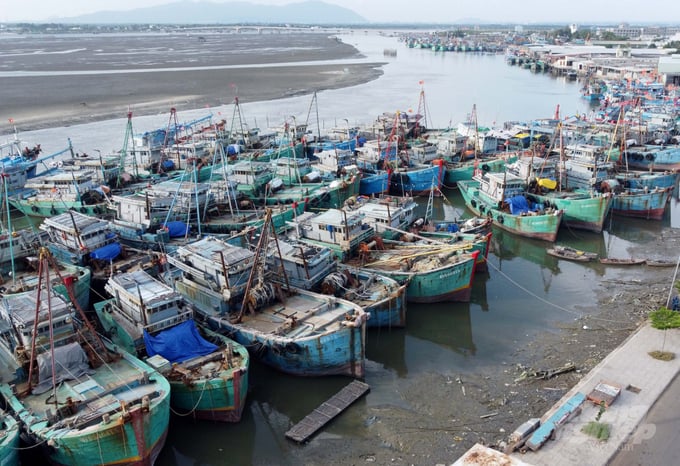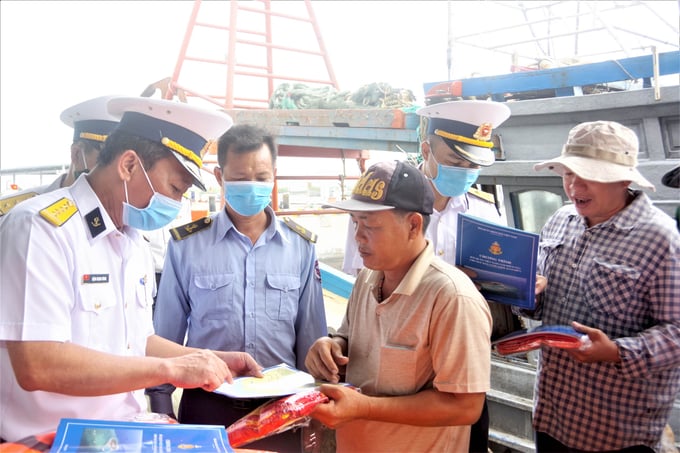November 27, 2025 | 10:59 GMT +7
November 27, 2025 | 10:59 GMT +7
Hotline: 0913.378.918
November 27, 2025 | 10:59 GMT +7
Hotline: 0913.378.918

The number of fishing vessels inspected at ports is still low. Photo: Minh Sang.
According to Mr. Vu Duyen Hai, Fisheries Department under the General Department of Fisheries, Vietnam still has many many limitations in the fight against illegal, unreported and unregulated (IUU) fishing.
For example, nearly 36% of fishing vessels have not been licensed. Out of 95.3% of fishing vessels that have been installed with a vessel monitoring system (VMS), 45-55% of them regularly lose connection. In many localities, the percentage of licensed fishing vessels is quite low, under 50%.
In particular, the control of the amount of exploited seafood at the ports is low, as up to 5 coastal provinces and cities have no statistics on the seafood that are passed through ports.
Additionally, encroachment on foreign waters still occurs regularly. In the first 8 months of this year, 62 cases/92 ships/845 fishermen were arrested and handled by foreign countries.
At ports, the number of vessels and the amount of exploited seafood being checked is low (accounting for 55% and 23% respectively). The rate of handling violations is also limited while law enforcement is ineffective and inconsistent.
Ms. Nguyen Thi Trang Nhung, Deputy Director of the Department of Science, Technology and International Cooperation (General Department of Fisheries), highlighted some major risks upon the European Commission (EC)’s arrival for inspection, which are also mentioned in international reports.
For example, in addition to certificates for seafood products exported to Europe, Vietnam also issues certificates for those exported to other markets such as Thailand or Malaysia.
Recently, Thailand has announced some records related to shipments exported to this country with signs of being erased and redone. From October 10-15, the EC inspection team will work with the Directorate of Fisheries of Thailand. One of their working agenda is to discuss the certificates of Vietnamese seafood shipments exported to Thailand.
To properly prepare for the EC’s visit to inspect the implementation of anti-IUU measures in October, Mr. Tran Dinh Luan, Director of the Directorate of Fisheries stressed the importance of completing the registration of fishing vessel records on the software system.
Furthermore, localities need to check and request vessels without VMS to immediately install this system. If just one fishing vessel is discovered to lack VMS by EC, it will be suspected to conduct illegal fishing.
Relevant localities and forces need to remain on duty to immediately handle the issue of fishing vessels losing connection to VMS. It must be dealt with strictly and seriously without any excuses, Luan added.

Fishermen in Ba Ria - Vung Tau Province are introduced about measures against IUU fishing. Photo: Minh Sang.
IAnother worrying issue, according to him, is that the penalties for violating fishing vessels this year in localities are low compared to previous years, which might cause EU inspectors to question that localities have not strictly and properly sanctioned violating fishing boats.
Border guards and authorities need to implement synchronously and cross-check between localities in controlling ships entering and leaving fishing ports to ensure their equal level of management.
The director also noted that the fishing activities must still be carried out normally as usual on the arrival day of the EC inspection team.
“The fishing port should not prevent the vessels from entering on that day. Otherwise, EC will immediately realize the abnormality when checking the history of fishing vessels entering and leaving the port,” he added.
To address the problem of IUU fishing, the EC has been evaluating exporting countries since 2012. Countries that fail to meet EC standards are issued a "yellow card" warning, followed by a "green card" if issues are resolved, or a "red card" if they are not. A red card can lead to a trade ban on fishery products.
The EC in October 2017 issued a yellow card due to Vietnam’s inadequate action to combat IUU fishing.
To ensure the yellow card is lifted soon, prime minister on September 14 issued Decision 1077/QD-TTg on preventing IUU fishing.
Officials from the EC will visit Vietnam again this October to check measures against IUU fishing in coastal areas. The trip aims to review the country's efforts in removing the “yellow card” warning issued by the EU and the check will be conducted directly at fishing ports.
Deputy Minister of Agriculture and Rural Development Phung Duc Tien emphasized that ministries, sectors, localities and units need to work together and strictly implement IUU fighting measures to achieve better results in this upcoming EC’s examination.
Translated by Phuong Ha

(VAN) As floodwaters recede, a vast network of irrigation works across eastern Gia Lai is emerging in a state of severe disrepair, with extensive damage demanding urgent restoration ahead of the 2025-2026 winter-spring cropping season.

(VAN) The conference reviewing three years of implementing Decision 911 identified the need to prioritize improving marine environmental quality and promoting sustainable fisheries development.

(VAN) Le Hoai Trung, Member of the Communist Party of Vietnam Central Committee and Minister of Foreign Affairs, held talks with Vi Thao, Chairman of the Guangxi Zhuang Autonomous Region (China) this week.

(VAN) The Mekong River Commission adopts the 2026 - 2030 Strategic Plan with a people-centered approach.
/2025/11/26/1720-1-200855_132.jpg)
(VAN) Viet Nam and Japan have many conditions to expand cooperation on climate change adaptation, particularly in disaster risk management based on advanced technologies.

(VAN) The strong development of digital technology and artificial intelligence is opening up opportunities to transform science and technology into a 'Magic eye' for disaster forecasting and early warning.

Applying vaccines and proactive disease prevention helps pig herds stay healthy, maintain productivity, reduce risks, and decrease reliance on antibiotics in modern livestock farming.